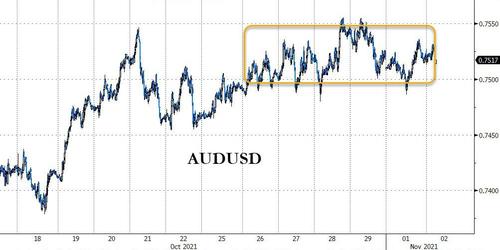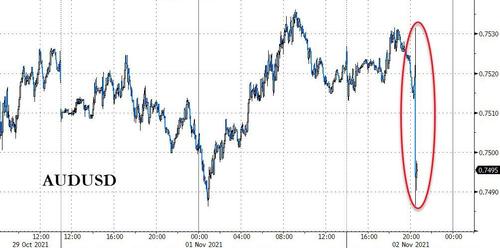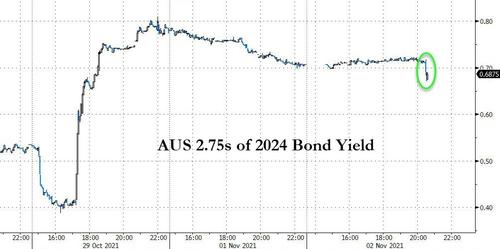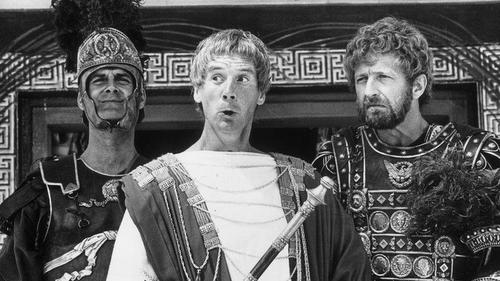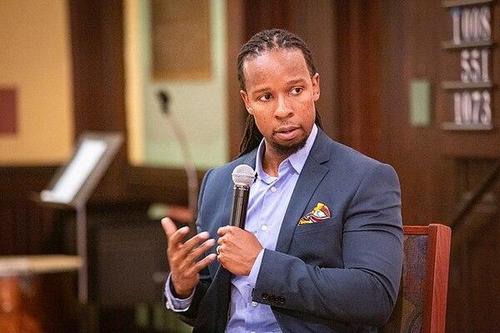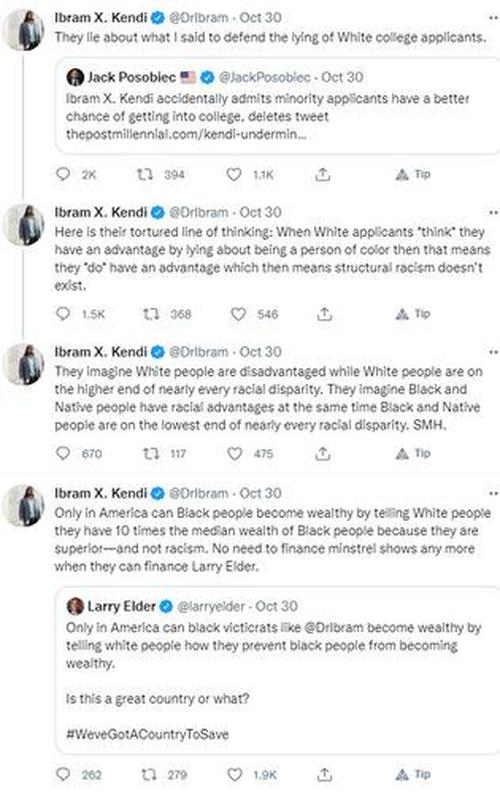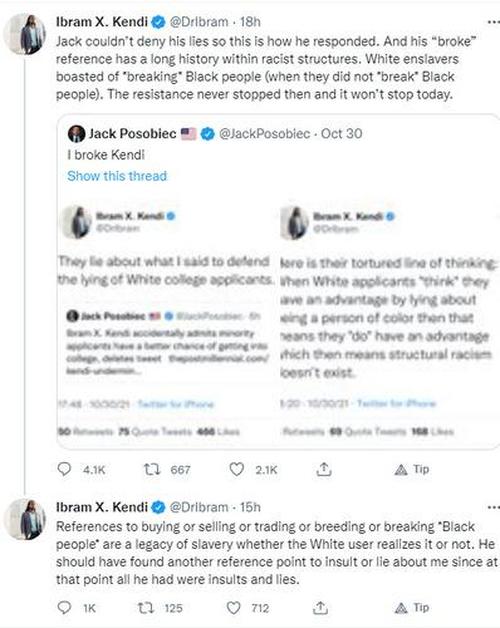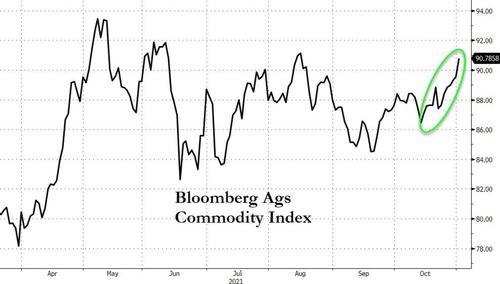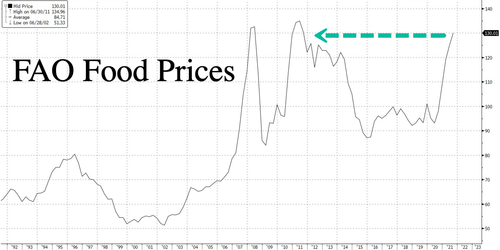Authored by Cynthia Chung via The Strategic Culture Foundation,
Huxley makes it crystal clear that he considers the world to be overpopulated, and that science and progress cannot be free to advance without limits.
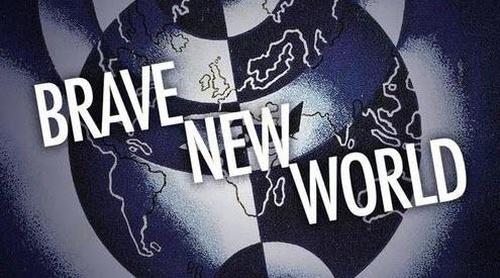
In Part 1 the question was discussed what was Aldous’ real intention in writing the Brave New World; was it meant as an exhortation, an inevitable prophecy or as an Open Conspiracy? An Open Conspiracy closely linked to not only H.G. Wells, who clearly laid out such a vision in his book by the same title, published in 1928, but a vision also in the vein of Aldous’ famous grandfather Thomas Huxley “Darwin’s bulldog” and mentor to Wells.
It is from here that we will continue to discuss what exactly were Aldous’ views on such matters, did he in fact believe in the need for a scientific dictatorship? A scientific caste system? Was he actually warning the people that such a dystopia would occur if we did not correct our course or was it all part of a mass psychological conditioning for what was regarded as inevitable, and that Aldous’ role was rather to “soften the transition” as much as possible towards a “dictatorship without tears”?
The War on Science
“ ‘A New Theory of Biology’ was the title of the paper which Mustapha Mond had just finished reading. He sat for some time, meditatively frowning, then picked up his pen and wrote across the title-page: ‘The author’s mathematical treatment of the conception of purpose is novel and highly ingenious, but heretical and, so far as the present social order is concerned, dangerous and potentially subversive. Not to be published.’ … A pity, he thought, as he signed his name. It was a masterly piece of work. But once you began admitting explanations in terms of purpose – well, you didn’t know what the result might be. It was the sort of idea that might easily decondition the more unsettled minds among the higher castes – make them lose their faith in happiness as the Sovereign Good and take to believing, instead, that the goal was somewhere beyond, somewhere outside the present human sphere, that the purpose of life was not the maintenance of well-being [as happiness and comfort], but some intensification and refining of consciousness, some enlargement of knowledge. Which was, the Controller reflected, quite possibly true. But not, in the present circumstance, admissible.”
– Aldous Huxley’s “Brave New World”
This is the credo for all scientific dictatorships, to forbid any search for knowledge whose purpose is the discovery of a universal truth, something that “is beyond, somewhere outside the present human sphere.” Something that is and will remain always true, and not just true so long as people are led to believe it is so.
Thus, a scientific dictatorship must deny purpose by all means and promote an artificial “cushy” conception of happiness and comfort, since the former makes for very bad servants/slaves and the latter for very good ones.
Purpose leads to unpredictability in the status quo, there are no sureties for an oligarchic system of governance in a world that is motivated by a purpose towards truth, beauty, and knowledge, as Mustapha Mond succinctly lays out.
It is also the case that whenever one discovers a universal truth, it unifies rather than divides, truth is thus the very enemy of tyranny, for it offers clarity. And one can no longer be ruled over when they can see a superior alternative to their oppression.
Therefore, under the rule of tyranny, truth must when possible be snuffed out, otherwise it is contorted until it is no longer recognizable, it is broken into fragments of itself in order to create factions, schools of opposing thought that are meant to confuse and lead its followers further astray.
To deny purpose is thus the necessary condition to rule within a scientific dictatorship. Whether its controllers believe in purpose or not is irrelevant, since it is simply not admissible.
The question thus is, where does Aldous fit into all of this? For starters let us take a look at Aldous’ family roots to see if indeed the apple did not fall too far from the tree…
Aldous’ grandfather T.H. Huxley (1825-1895) had made a name for himself by the age of twenty-five and was elected as a Fellow of the Royal Society in 1950. Within a span of just a few years he would rise to become a leading member of Britain’s scientific establishment.
By the late 1700s, discoveries in geology began to contradict the accepted religious view of Creation. It was increasingly found that steady changes were the primary cause of most geological formations which developed over very long spans of time and that these changes had even led to the extinction of certain organisms/creatures. This was the first time that the biblical view of Creation was ever challenged as a mainstream argument within the sciences.
By the first part of the 1800s the scientific community was primarily in agreement that living processes and their environments did indeed “evolve.”
In the 1820s Georges Cuvier (1769-1832) and Étienne Geoffroy Saint-Hilaire (1772-1844), once friends, had come into severe disagreement over the origins of anatomical forms which lead to a historic debate in 1830, raising issues that have yet to be resolved to this day.
In 1838, upon reading Thomas Malthus’ “An Essay on the Principle of Population,” (who is known for calling for the courting of the plague to address the crisis of overpopulation), Darwin formulated his theory for “evolution” based on the “natural selection” of the fittest, he coined the term as an analogy of what he termed the “artificial selection” of selective breeding, with reference in particular to the practice of horse breeding. Darwin saw a similarity between farmers picking the best stock in selective breeding, and a Malthusian “Nature” selecting from chance variants.
That is, Darwin’s ideas of “natural selection” and “survival of the fittest” implied no directionality to evolution but rather was based upon Nature’s selection of random variants. But how does one part of an organism evolve without affecting the other parts of said organism?
According to Étienne Geoffroy Saint-Hilaire, there is an inherent “potential” in evolution; the potential for change is inherent within the organism, and the shaping of its many parts occurs in a harmonic, coherent way. That is, change moves in a purposeful manner, not a random manner.
The evolution of wings for flight, the eyes for sight, the nervous system for thought; Geoffroy was stating that these were not the result of countless minute mutations occurring and being selected upon separate from the other, but that the transformations were occurring with the very intention to create forms of flight, sight and thought.
By Darwin rejecting this thesis, he created a paradox within his own theory. Either the potential for change is inherent in the organism in which many parts are able to change in a harmonic/coherent way, or it is not. However, if it is the latter, as Darwin claims it to be, random change of any part by itself without acknowledgement of the whole would more often than not lead to the death of the organism, as seen in studies of embryo formation, or would create a Dr. Moreau’s Island of freaks (which by the bye is another novel by our anti-hero H.G. Wells).
The elegant creations we actually do see arise through evolutionary processes would be an extreme rarity in such a world of randomness.
With everything we know today of the incredibly intricate details of biochemistry, the coordination of metabolic processes which occur in their thousands of “parts” would all need to evolve as randomly separate processes and yet, would also need to occur simultaneously and in conjunction with the other functioning parts. This would make Darwin’s concept for the selection of random variants within a coordinated functioning whole fundamentally impossible.
Not only is the evolution of the eye one of the miracles of evolution, it has countless variations upon itself, such that there is no one standard model for what is an “eye.” Are we thus to believe that this has randomly occurred not only once but thousands of times in each species with its own distinct variation of what is an “eye”?
In the early 1850s, Huxley had been introduced to Darwin and by the middle of the 1850s they were in close collaboration. Though Huxley never fully took to Darwin’s theory, he did become an avid defender and promoter of it nonetheless.
At the time there was strong opposition to Darwin and Huxley within Europe and the United States. James Dwight Dana (1813-1895), a contemporary of T.H. Huxley, was among the American leadership that opposed this view, and argued that evolution did progress with a directionality, using examples such as the observation that biological organisms were proceeding towards greater “cephalization.” That is, that evolution was forming a general trend towards increasingly sophisticated nervous systems that could respond and interact with their environment. Thus, evolution was towards greater forms of complexity with more sophisticated forms of function.
However, Thomas Huxley, “Darwin’s bulldog” was vehemently against this view of purposeful directionality in Nature. It did not matter that Darwin’s theory was just that, a theory, which still failed to explain much that was being observed in the evolutionary process.
Although it is beyond the scope of this paper to discuss this in further detail (for more refer here), one cannot deny two major changes that occurred in “modern science” as a result of T.H. Huxley’s avid promotion of Darwin’s theory of evolution, that 1) Nature, and thus one could say the Universe, was not governed by purpose but rather by randomness, and that 2) man was but a beast, no longer to be among the children of God, no longer regarded as partaking in anything that was divine or sacred.
And if man is but a beast what does he care for higher truths? What more does a beast need than the simple forms of comfort and happiness?
Modern Science begets Modern Religion begets a Modern Utopia?
Before we go on to speak about Aldous’ brother Julian Huxley, I will say just a few words on his father Leonard.
Leonard Huxley published in 1926 his “Progress and the Unfit,” which was subsequently used to promote the Eugenics movement, to which H.G. Wells and Leonard’s son Julian were outspoken avid supporters of. Leonard also wrote favourably of his father T.H. Huxley’s views and that of Charles Darwin.
In his book, Leonard discusses how modern-day science is only to look at the interdependence of body and mind, that the existence of the soul has been discredited by modern science, and thus that conditions for improvement on the human condition must solely rely upon the social and biological.
He goes on to state that modern society has too long tolerated the proliferation of the feeble minded and so creates an ever-lasting burden for itself. He claims that mental defectiveness (which ranged from criminal behaviour, insanity, physical deformities and forms of mental retardation to addictions such as alcoholism and gambling, homelessness, owing massive debt etc. etc.) were all to be considered heritable qualities.
Thus, those in possession of such unwanted qualities should be segregated from society or sterilised. He acknowledges that such measures may appear immoral, but that it is only immoral when coercion is used against persons of “normal intelligence,” for those who are deemed abnormal, unable to use reason, such standards of morality do not apply. This also appertained to what were considered to be the “lower” races, to which, T.H. Huxley was outspoken in his view that the “white race” was indeed the most superior race of all and that the “black race” was amongst the most inferior.
With “modern science,” what stood in the way of the “mechanics of enforced good breeding” if humankind were to be regarded as no different from other beasts? And if we were judged to have no soul, the application of so-called “morality” was up for interpretation if not deemed entirely irrelevant.
Julian Huxley (1887-1975), the older brother of Aldous, after serving in WWI became a Fellow at New College Oxford, serving as Senior Demonstrator in the University Department of Zoology. In 1925 he moved to King’s College London to work as Professor of Zoology. However, after only two years he resigned his chair to work full-time for H.G. Wells and his son G.P. Wells on “The Science of Life.”
For those who are not too familiar with the views of H.G. Wells, I think it apt to share a quote, from part of his “new Bible” trilogy, “Anticipations of the Reaction of Mechanical and Scientific Progress upon Human Life and Thought” published in 1901:
“It has become apparent that whole masses of human population are, as a whole, inferior in their claim upon the future, to other masses, that they cannot be given opportunities or trusted with power as the superior peoples are trusted, that their characteristic weaknesses are contagious and detrimental to the civilizing fabric, and that their range of incapacity tempts and demoralizes the strong. To give them equality is to sink to their level, to protect and cherish them is to be swamped in their fecundity. “
I assure you, there is plenty more where that came from.
“The Science of Life,” which was also a part of Wells’ “new Bible” trilogy, was to give a popular account of all major aspects of biology as known in the 1920s. It is credited in introducing modern ecological concepts and emphasised the importance of behaviourism and Jungian psychology.
At the very end of the 900 page volume, it is written:
“To have a world encumbered for a time with an excess of sterile jazz dancers and joy riders may be a pleasanter way to elimination than hardship and death. Pleasure may achieve what force and sword have failed to do. The world can afford it; it is not a thing to fret about. It is only a passing fashion on a grand scale this phase of sterilized “enjoyment.” The great thing is that it should be able and willing to sterilize itself…The types that have a care for their posterity and the outlook of the race will naturally be the types which will possess the future.”
This, believe it or not, is H.G. Wells at his best behaviour, amply toned down so to speak. To Wells this is a rather humane proposition, since those who are considered of defective biological stock are simply to be sterilised but are otherwise free to mingle within society, free to live out a comfortable life of pleasures in all their degeneracies with no threat that such contaminants will continue on in the future breeds of humankind.
Thus, the age of pleasure will be more effective than the age of the sword (such as WWI), at diminishing the lower castes into a more “manageable” number. Within a generation, the human stock will be purified and a “Modern Utopia,” another book of H.G. Wells, can finally begin. Earth will become a paradise full of plenty, largely made up of a higher caste of reasonable, intelligent, healthy and attractive individuals and we will finally obtain world peace and harmony, until perhaps the next purge….
Besides Julian Huxley acting as Vice-President from 1937-1944 and President from 1959-1962 of the British Eugenics Society, he was also the first director-general of UNESCO (United Nations Educational, Scientific and Cultural Organization) in 1946, to which he wrote its mandate “UNESCO: Its Purpose and Its Philosophy” that same year.
In it Julian lays out the need for a world government as the only means for avoiding war, and that the full sovereignty of separate nation states should be transferred over to this world government accordingly, under one political unity to which he expands upon, writing:
“At the moment, it is probable that the indirect effect of civilization is dysgenic instead of eugenic, and in any case it seems likely that the dead weight of genetic stupidity, physical weakness, mental instability and disease proneness, which already exist in the human species will prove too great a burden for real progress to be achieved. Thus even though it is quite true that any radical eugenic policy will be for many years politically and psychologically impossible, it will be important for UNESCO to see that the eugenic problem is examined with the greatest care and that the public mind is informed of the issues at stake so that much that is now unthinkable may at least become thinkable.” (For more on this refer here.)
In 1928, H.G. Wells publishes his “The Open Conspiracy: Blue Prints for a World Revolution,” where he calls for the reform of religion into a “modern religion,” which was only fitting now that science had become a “modern science.” In his concept of modern religion, he states that it will be necessary to strip religion down to its raw elements of service and subordination. Wells also wrote “The New World Order” in 1940, and no doubt, was a guiding influence on Julian’s outlook when he wrote the manifesto for UNESCO.
The reader should also know that T.H. Huxley was the mentor of H.G. Wells and introduced him to the writings of Thomas Malthus and Charles Darwin.
[Refer to Part 1 of this series for an in-depth discussion on how H.G. Wells influenced the works of Aldous Huxley.]
The 20th Century Descent of Man
At the very start of the 20th century, the influential International Congress of Mathematicians organised a conference in Paris, France 1900. It was at this conference that David Hilbert, a leading mathematician at Göttingen University was invited to speak on the future of mathematics, where he stressed the need for the field of mathematics to “prove that all axioms of arithmetic are consistent” and to “axiomatize those physical sciences in which mathematics plays an important role.”
What Hilbert was calling for in his challenge for the future of mathematics was that all scientific knowledge be reduceable to the form of mathematical “logic” so to speak; that it be contained within a minimum of accepted truths and rules of derivation, which could be proven by consistent and complete formal mathematical proofs.
Thus, all scientific knowledge would in the future be deduced from such mathematical models, there was nothing left to “discover” in the typical sense of what defined scientific investigations during the 19th century and earlier, they only need refer to the appropriate mathematical model.
In 1900, Bertrand Russell and Alfred North Whitehead set out to meet Hilbert’s challenge which resulted in the “Principia Mathematica,” published thirteen years later.
Although Kurt Gödel would disprove the entire premise for the “Principia Mathematica” with his “incompleteness theorems” which show the limits of provability in formal axiomatic theories, the “Principia Mathematica” is one of the most influential works of the 20th century, on not only shaping modern logic but also formed the basis for the latter development of cybernetics and systems analysis by Russell’s student Norbert Wiener during WWII.
Before you conclude that Russell himself didn’t personally believe that irrationality was a fundamental force in the Universe simply because he tried formalizing said Universe, it is worth reading a section of his bitterly misanthropic view of humanity presented in his 1903 “A Free Man’s Worship”:
“That man is the product of causes that had no prevision of the end they were achieving; that his origin, his growth, his hopes and fears, his loves and his beliefs, are but the outcome of accidental collocations of atoms; that no fire, no heroism, no intensity of thought and feeling, can preserve individual life beyond the grave; that all the labors of the ages, all the devotion, all the inspiration, all the noonday brightness of human genius, are destined to extinction in the vast death of the solar system, and that the whole temple of Man’s achievement must inevitably be buried beneath the debris of a universe in ruins- all these things, if not quite beyond dispute, are yet so nearly certain that no philosophy which rejects them can hope to stand… Only within the scaffolding of these truths, only on the firm foundation of unyielding despair, can the soul’s habitation henceforth be safely built.”
Whether deterministic or random in view, the goal was the same, to promote a concept of the Universe that had no governing purpose, no directionality and no morality, that it was essentially a mechanism, discoverable by a few simple laws. This was not something new, the Enlightenment had already done much to emphasize individualism, skepticism and “science” reduced to the confines of empiricism and agnosticism.
With such a view our connection to the Universe becomes inconsequential, with the Universe seen as something cold, unknowable and ultimately dead or dying. Such a concept only further enforces that there is no real meaning to anything, there is no purpose, at least, it is not a purpose that we have any place in.
During the First World War, Aldous Huxley spent much time at the Garsington Manor, home of Lady Ottoline Morrell, a lover of Bertrand Russell, who believed (as Aldous and Julian would also), in the concept of open marriage. Although T.H. Huxley knew Russell’s parents, Lord and Lady Amberley, it was at the Garsington Manor that Aldous first met Bertrand Russell and the Bloomsbury Group.
It is also where he met his first wife Maria Nys, a wartime Belgian refugee who had been invited to stay with Lady Ottoline Morrell. Maria, who was bisexual, had entered into a several year love affair with Lady Ottoline starting at the age of sixteen. Maria did finally accept Aldous’ proposal and they were married in 1919 keeping an open marriage.
The Bloomsbury Group or Set, which met regularly at Lady Ottoline’s was an association of English writers, intellectuals, philosophers and artists which reflected in large part the influence of G.E Moore (who wrote the “Principia Ethica” in 1903) and Bertrand Russell who were amongst the founders of analytic philosophy. Alfred North Whitehead was also a member of the group.
As Dorothy Parker, American poet and writer, described them in a famous quote of hers, “they lived in squares, painted in circles and loved in triangles”.
Aldous Huxley would maintain a loose association with the Bloomsbury Group. It appears Aldous had a similar approach to Russell as he did with Wells, although he seems to have a serious dislike for both men, he nonetheless was greatly influenced by their works. In 1932, Russell exclaims in a letter to his publisher that the “Brave New World” was “merely an expansion of the two penultimate chapters of his ‘The Scientific Outlook,’ “ adding that “the parallelism applies in great detail, e.g., the prohibition of Shakespeare and the intoxicant producing no headache.” Russell went so far as to contemplate charging Aldous with plagiarism, to which his publisher dissuaded him from pursuing.
In Russell’s “The Scientific Outlook” published in 1930 he describes a caste system with the need for two separate modes of education, one for the elite ruling class and the other for the slave class. The ruling class is to be concerned with improving the scientific technique, while “the manual workers [are to be] contented by means of continual new amusements.”
Aldous echoes this sentiment in his “Brave New World Revisited,” where he writes:
“The older dictators fell because they could never supply their subjects with enough bread, enough circuses, enough miracles and mysteries.”
Although it is said that Aldous wrote the “Brave New World” as a satire of the works of H.G. Wells, and what appears to be the works of Russell as well, as already shown in Part 1 this is not true. Aldous is incorporating the ideas of Wells and Russell into his works, and though he may find these men dislikeable, he nonetheless never actually contradicts their views in any of his writings or lectures. The entire premise for his “Brave New World Revisited,” published in 1958, instead reinforces those very views.
Aldous makes it crystal clear that he considers the world to be overpopulated, that this is a crisis that must be checked, and that science and progress cannot be free to advance without limits. He restresses these very themes again in his last novel “The Island” as well.
In “Brave New World Revisited” he writes:
“The annual increase of numbers should be reduced. But how? We are given two choices – famine or pestilence and war on the one hand, birth control on the other…how can those who ought to take the pill, but don’t want to, be persuaded to change their minds?…In reducing the birth rate of those industrially backward societies where such a reduction is most urgently needed?…Or consider the backward societies that are now trying to industrialise. If they succeed, who is to prevent them, in their desperate efforts to catch up and keep up, from squandering the planet’s irreplaceable resources as stupidly and wantonly as was done, and is still being done, by their forerunners in the race?”
Here we need only replace the word “pill” with “sterilisation” and not much has changed.
In fact, as published in The Guardian, “Huxley was in favour of genetic breeding programmes to arrest the multiplication of the unfit. In a particularly unsavoury article, published in 1930 in the Evening Standard, he confessed anxiety about the proliferation of mental defectives and called for their compulsory sterilisation.”
Brave New World was written one year later in 1931.
It looks like the apple did not fall too far from the tree after all…
[Part 3 will discuss Aldous’ role in shaping the Esalen Institute, the Vedanta Society, his relationship to William Sargant and the CIA’s MKUltra, and how Aldous’ form of ideological spirituality went on to shape the drug-counter-culture movement.]



